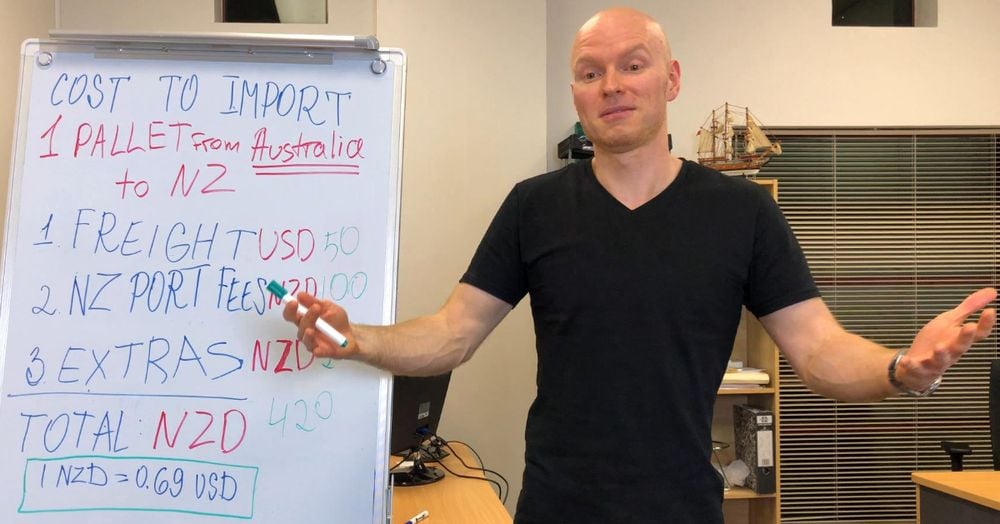
Costs to Import One Pallet (or More) from Australia to NZ
5-minute read (9-minute watch)
You’ll learn:
- What are the costs to import 1 pallet of standard goods from Australia to NZ
- The main components of these costs
- In what way you can calculate the cost of importing more than 1 pallet
- How your customs broker can help you save money
- Why a local freight forwarding company is better
Max: Today we are talking about the cost to import one pallet from Australia to New Zealand. We’re going to discuss how you can import one or more pallets of general goods.
Let’s discuss what a standard pallet is. It’s anything that doesn’t require special care: your appliances, furniture, clothing. Also important to specify that one pallet has a standard size – 1m wide, 1m deep and 1m high, which is 1 cubic meter, up to 300 kilos.
If you want to import from any major port in Australia – whether it’s Sidney, Melbourne or Brisbane – to major ports in New Zealand – Oakland, Christchurch and Tauranga – you can use these rates; they are applicable in all situations.
#1. FREIGHT
Max: First and one of the most critical cost would be your ocean freight. If you want to move the goods from major ports in Australia to a major port in New Zealand, for 1 cubic meter, you’re going to pay roughly 50 USD for your ocean freight.
#2. NZ PORT FEES
Max: Then upon arrival, you have to move the container from the port to a local warehouse to unload it and make it available for you to pick it up. These are “New Zealand port fees”; I would allow roughly a hundred NZD per 1 cubic meter.
#3. EXTRAS
Max: Then, you’ve got extra fees: documentation fees, customs brokerage fees. I would allow 250 NZD for these extra fees.
If you convert everything – from USD to NZD – and add everything up, the cost of importing a 1 cubic meter pallet from a major port in Australia to New Zealand will be 420 NZD.
As you can see, it’s not that expensive to import, and these are your mandatory costs. I’ll explain later what are the extra fees, and how you can minimize them.
You’ve got 420 NZD, that’s your minimum to import one pallet of standard goods that don’t require special care.
On top of that, you want to think about cargo insurance . Cargo insurance is roughly 1% of the insured amount.
Say, if it’s costly machinery and it’s 200 000 NZD, then that would be 200 NZD just for the insurance, that’s on top of 420 NZD. That’s a minimum level. If it’s, say, 5 000 NZD, expect to pay 200 NZD for the insurance.
You have to decide whether it’s worth the risk. We advise all our clients to have cargo insurance; it’s paramount, especially if that’s your first import to New Zealand, you don’t want to risk.
Another extra fee that you want to think about is the tracking – once the cargo arrives in New Zealand, you have to consider how you’re going to transfer the goods from this local warehouse to your warehouse or your house.
A freight forwarder can help you with that: they can hire the truck, arrange the delivery. I would allow 100 NZD for 1 cubic meter, that’s minimum on top. If you have bad access, you may need to hire a crane; they charge 200 NZD an hour.
You have to be careful about that; if you order the truck, make sure that it will fit your driveway. You can send the photos to your truck driver and get written information, that there’s going to be easy access.

BONUS TIPS #1. COSTS TO IMPORT 1+ PALLET
Max: If you want to import more than one pallet – say, three pallets of the same size, 3 cubic meters up to 1 ton – you don’t multiply 420 NZD by 3; this can be too expensive, you might as well send the whole container. If you send three pallets, you only multiply these two on the top, and the rest will be fixed.
The more you send, the cheaper it is. Always negotiate; you can easily knock down 10%. If you send 10-12 shipments a year, you can get even better discounts – 15% easy.
Say, three pallets, 3 cubic meters, 1 ton – if you multiply that, plus the document fees, customs brokerage service, that will be 750 NZD plus GST.
I would have to mention that all these fees exclude GST because businesses can claim GST back; it’s a standard business practice to add GST on top.
Obviously, your taxes are on top, and you may be required to pay import duty. Import GST is 15%, and import duty in New Zealand on most goods is 0%, but in some cases, it could be 5-10%.
A good customs broker will be able to find special codes that could save you some money on duty.
BONUS TIPS #2. CHOOSE YOUR CUSTOMS BROKER AND FREIGHT FORWARDER CAREFULLY
Max: Once again, it’s a good thing to talk to your customs broker, make sure that they have experience in the commodities that you import, and you’d be able to save.
I’ve got a client that imported some building materials one month ago, and their customs broker, unfortunately, used the wrong customs quote; so they had to pay 5% on 10 000 NZD, which they shouldn’t have paid – that’s money wasted.
Make sure you talk to your customs broker in advance and get three other quotes; then you’ll be able to see whether you’re going to save or not.
What are the common mistakes? When you import the goods, the mistake is not getting a quote from a local broker.
In many cases you get a reasonable price for ocean freight – believe it or not, sometimes you get a free ocean freight for shipping goods from overseas, from Australia to New Zealand.
But little we know that some of the costs will be hidden when the cargo arrives in New Zealand.
There will be another middleman, another company that will give you a call, say, a week before arrival and they’ll send you another 300 or 400 NZD – could be even more – extra costs that you didn’t budget for.
My tip of the day to get at least three quotes, and I would use a local freight forwarding company because you will be protected by the New Zealand law, by the Fair Trading Act.
If something happens, you can visit their office, talk to them and work it out. Because most New Zealand companies want to find a mutually beneficial solution. They want your business – if you import on a regular basis, you have to find some common grounds.

Alright, today we talked about three major costs, three fees that you have to pay when you import one pallet from Australia to New Zealand.
If you got any other questions, please, send us an email, we’d be happy to answer.
We’d love to answer any of your questions! Contact us now
P.S. Do you know of other people that will find this article useful? Please share it on social media. Thank you!
